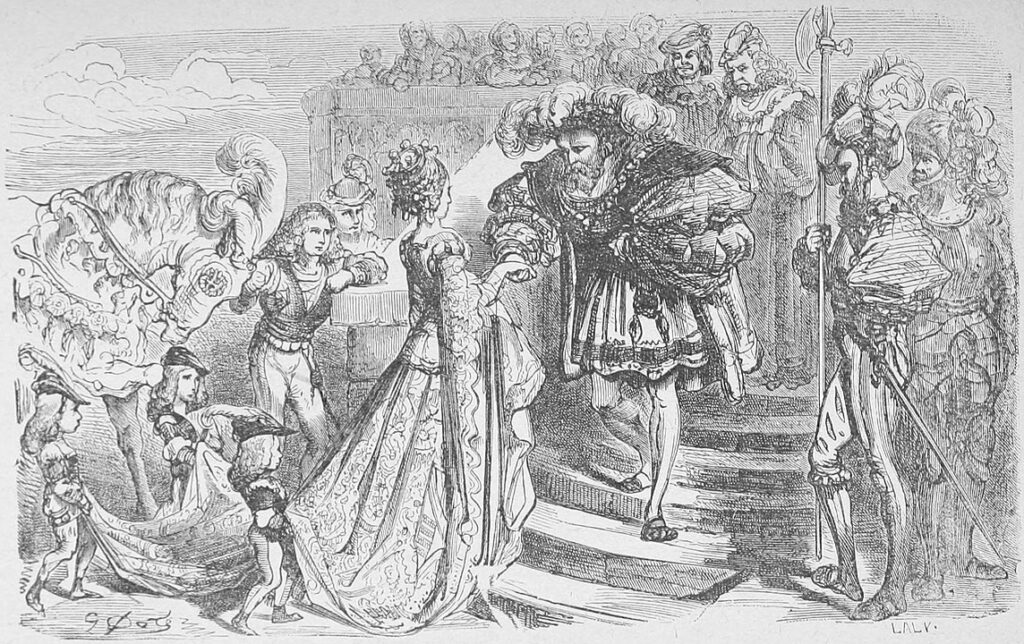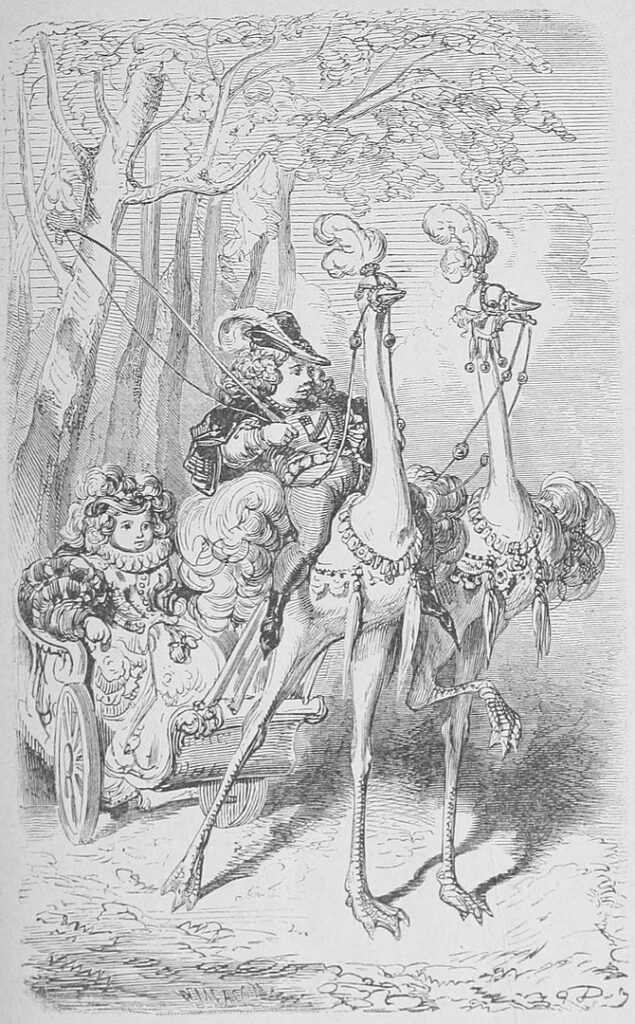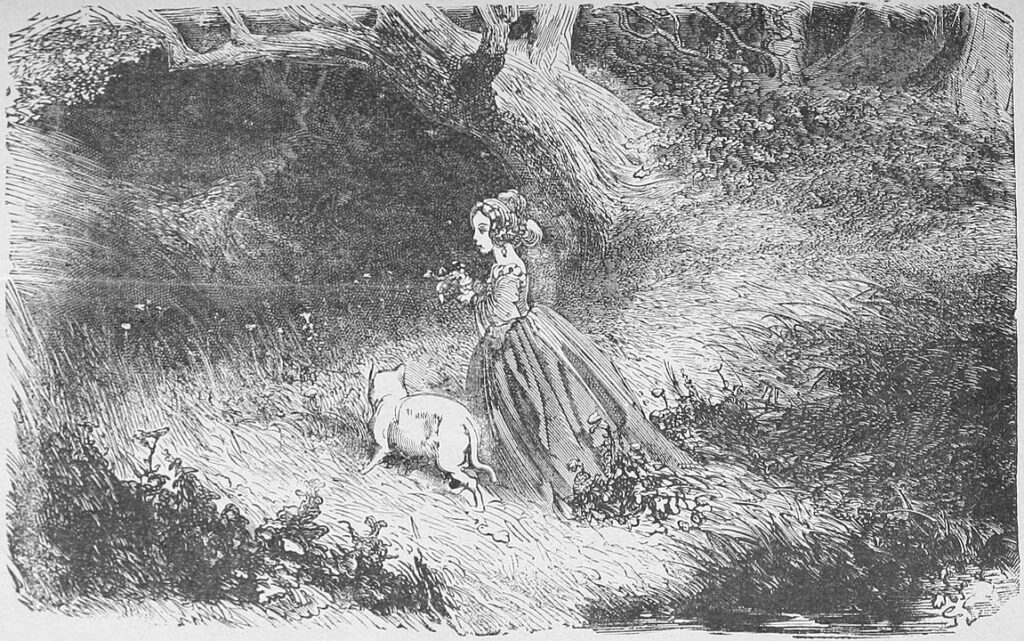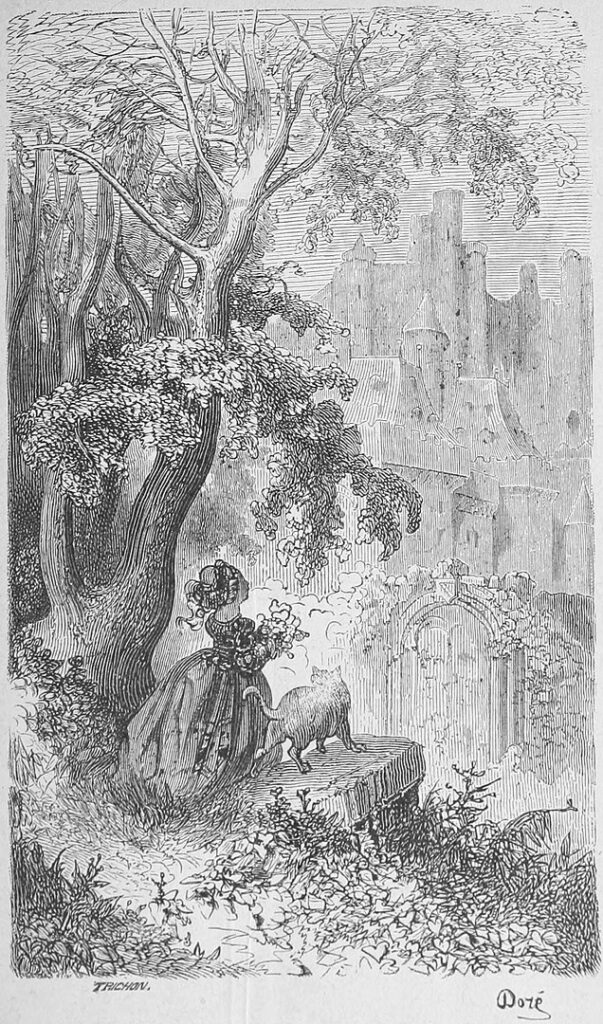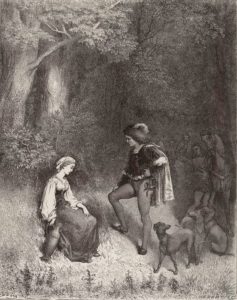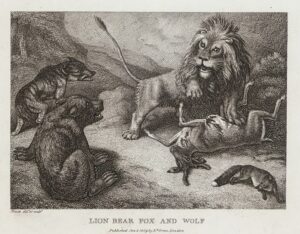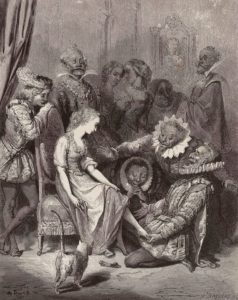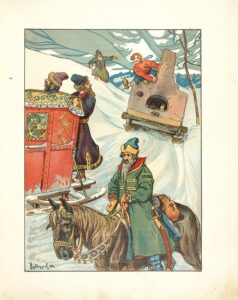
The story of Blondine
LIRE
There was a king named Benin; everyone loved him, because he was good; the wicked feared him, because he was just. His wife, Queen Doucette, was as good as he was. They had a little princess who was called Blondine because of her beautiful blonde hair, and who was as good and charming as her father the king and her mother the queen. Unfortunately the queen died a few months after Blondine’s birth, and the king cried for a long time. Blondine was too small to understand that her mommy had died, so she did not cry and continued to laugh, play, suckle and sleep peacefully. The king loved Blondine dearly, and Blondine loved the king more than anyone else in the world. The king gave her the most beautiful toys, the best candies, the most delicious fruits. Blondine was very happy.
One day, King Benin was told that all his subjects were asking him to remarry in order to have a son who could be king after him. The king refused at first; finally he gave in to the urgings and desires of his subjects, and said to his minister Leger:
“My dear friend, they want me to remarry; I am still so sad about the death of my poor wife Doucette, that I don’t want to look for another one myself. Take charge of finding me a princess who will make my poor Blondine happy: I don’t ask for anything else. Go, my dear Leger; when you have found a perfect woman, you will ask her in marriage and bring her.”
Leger left at once, went to all the kings, and saw many princesses, ugly, hunchbacked, wicked; finally he arrived at King Turbulent, who had a pretty, witty, amiable girl who seemed good. Leger found her so charming that he asked her to marry his king Benin, without asking if she was really good. Turbulent, delighted to get rid of his daughter, who had a mean, jealous and proud character, and who moreover bothered him for his travels, his hunts and his constant running, gave her immediately to Leger, so that he could take her with him to the kingdom of King Benin.
Leger left, taking the princess Fourbette and four thousand mules loaded with the princess’s belongings and jewels.
They arrived at the home of King Benin, who had been notified of their arrival by a courier; the king came to meet Princess Fourbette. He found her pretty, but she was far from having the sweet and kindly air of poor Doucette! When Fourbette saw Blondine, she looked at her with such wicked eyes, that poor Blondine, who was already three years old, was frightened and began to cry.
What is wrong with her?” asked the king. Why is my sweet and wise Blondie crying like a naughty child?
– Daddy, dear daddy,” cried Blondine, hiding in the king’s arms, “don’t give me to this princess; I’m afraid; she looks so mean!”
The king, surprised, looked at the princess Fourbette, who could not quickly enough change her face so that the king did not see there that terrible look that so frightened Blondine. He immediately resolved to see to it that Blondine lived separated from the new queen, and remained as before under the exclusive care of the nurse and the maid who had brought her up and who loved her tenderly. The queen therefore rarely saw Blondine, and when she met her by chance, she could not entirely conceal the hatred she felt for her.
After a year, she had a daughter, whom they named Brunette, because of her coal-black hair. Brunette was pretty, but much less pretty than Blondine; she was, moreover, mean like her mother, and she hated Blondine, to whom she did all sorts of mean things: she bit her, pinched her, pulled her hair, broke her toys, stained her beautiful dresses. The good little Blondie never got angry; she always tried to excuse Brunette.
Oh, Daddy,” she said to the king, “don’t scold her; she’s so little, she doesn’t know that she’s hurting me by breaking my toys… It’s to play that she bites me… It’s to have fun that she pulls my hair,” etc.
King Benin embraced his daughter Blondine and said nothing, but he could see that Brunette did all this out of spite and that Blondine excused her out of kindness. So he loved Blondine more and more and Brunette less and less.
Queen Fourbette, who had a mind of her own, saw all this too; but she hated the innocent Blondine more and more; and, if she had not feared the wrath of King Benin, she would have made Blondine the most unhappy child in the world. The king had forbidden that Blondine should ever be alone with the queen, and, as it was known that he was as just as he was kind, and that he punished disobedience severely, the queen herself dared not disobey.
II
LOST BLONDINE
Blondine was already seven years old and Brunette was three. The king had given Blondine a pretty little carriage harnessed to two ostriches and driven by a little page of ten years old, who was a nephew of Blondine’s nurse. The page, whose name was Gourmandinet, loved Blondine dearly, with whom he played since his birth and who had for him a thousand kindnesses. But he had a terrible defect; he was so greedy and he liked sweets so much, that he would have been able to commit a bad action for a bag of candies. Blondine often said to him:
“I like you, Gourmandinet, but I don’t like to see you so greedy. Please correct this ugly fault, which everyone hates.
Gourmandinet kissed his hand and promised to correct himself; but he continued to steal cakes in the kitchen, sweets in the pantry, and was often whipped for his disobedience and greed.
Queen Fourbette soon learned of the reproaches made against Gourmandinet, and she thought she could use the little page’s naughty flaw and make him serve for Blondine’s loss. Here is the project that she conceived:
The garden where Blondine rode in her little ostrich-drawn carriage, with Gourmandinet as her coachman, was separated by a fence from a magnificent and immense forest, which was called the Forest of Lilacs, because all year round it was full of lilacs always in bloom. No one went into this forest; it was known that it was enchanted and that, once you entered it, you could never leave it again. Gourmandinet knew the terrible property of this forest; he had been strictly forbidden to ever direct Blondine’s carriage to this side, lest Blondine inadvertently cross the gate and enter the forest of the Lilacs.
Many times the king had wanted to build a wall along the gate, or at least to tighten the fence so that it was no longer possible to pass through it; but as the workmen laid the stones or fences, an unknown force removed them and made them disappear.
Queen Fourbette began to win Gourmandinet’s friendship by giving him new sweets every day; when she had made him so greedy that he could no longer do without the sweets, jellies, and cakes that she gave him in profusion, she sent for him and said:
“Gourmandinet, it depends on you to have a chest full of candy and sweets, or never to eat them again.
– Never eat any more! Oh, Madam, I shall die of grief. Speak, Madam; what shall I do to avoid this misfortune?
– You must,” said the queen, looking at him fixedly, “take the princess Blondine near the forest of Lilacs.
– I cannot, Madame, the king has forbidden me.
– Ah! you cannot? Then, farewell; I will not give you any more sweets, and I will forbid that nobody in the house ever gives you any.
– Oh, Madame,” said Gourmandinet, crying, “don’t be so cruel! Give me another order that I can execute.
– I repeat that I want you to lead Blondine near the forest of Lilacs, and that you encourage her to get out of the carriage, to cross the gate and enter the forest.
– But, Madame,” said Gourmandinet, turning pale, “if the princess enters that forest, she will never leave it; you know that it is an enchanted forest; to send my princess there is to send her to certain death.
– A third and last time, do you want to take Blondine there? Choose: either a huge chest of sweets that I will renew every month, or never sweets or pastries.
– But how will I escape the terrible punishment that the king will inflict on me?
– Don’t worry about that; as soon as you get Blondine into the forest of Lilacs, come and find me: I’ll make you leave with your sweets, and I’ll take care of your future.
– Oh, Madame, for pity’s sake, do not oblige me to destroy my dear mistress, who has always been so good to me!
– You hesitate, little wretch! And what does it matter to you what happens to Blondine? Later on, I’ll put you in Brunette’s service, and I’ll see to it that you never run out of candy.”
Gourmandinet thought for a few more moments, and resolved, alas! to sacrifice his good little mistress for a few pounds of candy. All the rest of the day and all night he still hesitated to commit this great crime; but the certainty of not being able to satisfy his gluttony any longer, if he refused to carry out the queen’s order, the hope of finding Blondine one day by addressing some powerful fairy, made him stop these irresolutions and decide to obey the queen.
The next day, at four o’clock, Blondine ordered her little carriage, got into it after having kissed the king and having promised him to come back in two hours. The garden was large. Gourmandinet made the ostriches go to the opposite side of the forest of Lilacs.
When they were so far away that they could no longer be seen from the palace, he changed direction and walked towards the gate of the Lilac Forest. He was sad and silent; his crime weighed on his heart and his conscience.
What is the matter with you, Gourmandinet?” asked Blondine; “you don’t speak; are you ill?
– No, Princess, I am well.
– How pale you are! Tell me what’s wrong with you, my poor Gourmandinet. I promise to do my best to make you happy.
This kindness of Blondine was about to save her by softening Gourmandinet’s heart; but the memory of the sweets promised by Fourbette destroyed this good movement.
Before he could answer, the ostriches touched the gate of the forest of Lilacs.
“Oh! the beautiful lilacs! exclaimed Blondine; what a sweet smell! How I would like to have a big bouquet of these lilacs to give to Daddy! Go downstairs, Gourmandinet, and get me some branches.
– I can’t go downstairs, princess; the ostriches might go away while I’m away.
– What does it matter?” said Blondine, “I’ll bring them back to the palace alone.
– But the king would scold me for having abandoned you, princess. It is better that you go yourself to pick and choose your flowers.
– That’s right,” said Blondine, “I’d be very angry to have you scolded, my poor Gourmandinet.
And, saying these words, she jumped out of the carriage, crossed the bars of the gate and began to pick the lilacs.
At this moment, Gourmandinet shuddered, became troubled: remorse entered his heart; he wanted to make amends by calling Blondine back: but, although Blondine was only ten steps away from him; although he saw her perfectly, she did not hear his voice and went little by little into the enchanted forest. For a long time he saw her picking lilacs, and finally she disappeared from his sight.
For a long time he wept for his crime, cursed his greed, and hated the queen. Finally he thought that the hour when Blondine had to be back at the palace was approaching; he returned to the stables by the back, and ran to the queen, who was waiting for him. Seeing him pale and his eyes red with the terrible tears of remorse, she guessed that Blondine was lost.
“Is it done?” she said.
Gourmandinet nodded his head yes; he had no strength to speak.
Come,” she said, “here is your reward.
And she showed him a chest full of sweets of all kinds. She had a valet take it away and tie it to one of the mules that had brought her jewels.
“I entrust this chest to Gourmandinet, so that he may carry it to my father. Go away, Gourmandinet, and come back for another one in a month.”
At the same time, she put a purse full of gold in his hand. Gourmandinet mounted the mule without saying a word. He galloped off; soon the mule, which was mean and stubborn, impatient with the weight of the chest, began to kick, to bend over, and did so well that he threw Gourmandinet and the chest to the ground. Gourmandinet, who did not know how to stand on a horse or a mule, fell headlong on the stones and died instantly. So he did not even get the profit from his crime that he had hoped for, since he had not yet tasted the sweets that the queen had given him.
Nobody regretted it, because nobody had loved him, except the poor Blondine, whom we are going to join in the forest of Lilacs.
III
THE FOREST OF LILACS
When Blondine entered the forest, she began to pick beautiful branches of lilacs, rejoicing to have so many and which smelled so good. As she picked more and more beautiful ones, she emptied her apron and hat, which were full of them, and filled them again.
It had been more than an hour since Blondine had been so busy; she was hot; she was beginning to feel tired; the lilacs were heavy to carry, and she thought it was time to return to the palace. She turned around and saw herself surrounded by lilacs; she called to Gourmandinet: no one answered her. “It seems that I have gone farther than I thought,” said Blondine: “I will go back, though I am a little tired, and Gourmandinet will hear me and come to meet me.
She walked for some time, but she could not see the end of the forest. Many times she called to Gourmandinet, but no one answered her. Finally she began to be afraid.
“What will become of me in this forest all alone? What will my poor father think of not seeing me come back? And poor Gourmandinet, how will he dare to return to the palace without me? He will be scolded, beaten perhaps, and all because of my fault, because I wanted to go down and pick these lilacs! I’m going to die of hunger and thirst in this forest, if the wolves don’t eat me tonight.
And Blondine fell to the ground at the foot of a large tree and began to weep bitterly. She cried for a long time; finally tiredness overcame her sorrow; she laid her head on her lilac boot and fell asleep.
IV
FIRST AWAKENING OF BLONDINE – BEAU-MINON
Blondine slept all night; no ferocious beast came to disturb her sleep; the cold was not felt; she woke up the next day rather late; she rubbed her eyes, very surprised to see herself surrounded by trees, instead of being in her room and in her bed. She called to her maid; a soft mewing answered her; astonished and almost frightened, she looked down and saw at her feet a beautiful white cat looking at her with sweetness and meowing.
Ah! Beau-Minon, how pretty you are!” cried Blondine, running her hand over his beautiful hair, white as snow. I am very happy to see you, Beau-Minon, because you will take me to your house. But I am very hungry, and I shall not have the strength to walk until I have eaten.”
As soon as she had finished these words, Beau-Minon meowed again and showed her with his little paw a package that was lying next to her and that was wrapped in a fine white cloth. She opened the package and found some butter sandwiches; she bit into one of the sandwiches, found it delicious, and gave a few pieces to Beau-Minon, who seemed to munch them with delight.
When she and Handsome had eaten well, Blondine leaned over to him, caressed him and said:
“Thank you, my Beau-Minon, for the lunch you brought me. Now, can you take me back to my father, who must be sorry I’m not here?”
Beau-Minon shook his head with a plaintive mewl.
Ah, you understand me, Beau-Minon,” said Blondine. Then have pity on me and take me to some house, so that I do not perish of hunger, cold and terror in this dreadful forest.”
Beau-Minon looked at her, made a little sign with his white head that meant he understood, stood up, took several steps and turned around to see if Blondine was following him.
“Here I am, Beau-Minon,” said Blondine, “I am following you. But how shall we pass through these bushes so thick? I see no way.”
Beau-Minon, for all answer, rushed into the bushes, which opened of themselves to let Beau-Minon and Blondine pass, and which closed again when they had passed. Blondine walked like this for an hour; as she advanced, the forest became clearer, the grass was finer, the flowers grew in abundance; one saw pretty birds singing, squirrels climbing along the branches. Blondine, who had no doubt that she was going to leave the forest and see her father again, was delighted with everything she saw; she would have gladly stopped to pick flowers: but Beau-Minon was always trotting ahead, and meowed sadly when Blondine pretended to stop.
After an hour, Blondine saw a magnificent castle. Beau-Minon led her to the golden gate. Blondine didn’t know how to get in; there was no bell, and the gate was closed. Beau-Minon had disappeared; Blondine was alone.
V
BONNE-BICHE
Beau-Minon had entered through a small passageway that seemed to have been made for him, and he had probably warned someone in the castle, for the gate opened without Blondine having called. She entered the courtyard and saw no one; the castle gate opened by itself. Blondine entered a hallway made of rare white marble; all the doors opened by themselves like the first one, and Blondine went through a series of beautiful salons. Finally she saw, at the bottom of a pretty blue and gold lounge, a white doe lying on a bed of fine and odorous herbs. Beau-Minon was near her. The doe saw Blondine, got up, went to her and said:
“Welcome, Blondine; it’s been a long time since I and my son Beau-Minon have been waiting for you.”
And as Blondine looked frightened:
“Rest assured, Blondine, you are with friends; I know the king your father, and I love him as well as you.”
– Oh, Madame,” said Blondine, “if you know the king my father, take me home; he must be very sad at my absence.
– My dear Blondine,” said Goodluck, sighing, “it is not in my power to return you to your father; you are under the power of the enchanter of the forest of Lilacs. I myself am subject to his power, which is greater than mine; but I can send your father dreams that will reassure him about your fate and tell him that you are in my home.
– How! Madam,” cried Blondine with fear, “will I never see my father again, my poor father whom I love so much?
– Dear Blondine, let’s not worry about the future; wisdom is always rewarded. You will see your father again, but not yet. Meanwhile, be docile and good. Beau-Minon and I will do our utmost to make you happy.”
Blondine sighed and shed a few tears. Then she thought that it would be wrong to acknowledge the kindness of Good-Hair to be with her; so she restrained herself and tried to talk cheerfully.
Bonne-Biche and Beau-Minon took her to see the apartment that was meant for her. Blondine’s room was all upholstered in pink silk embroidered in gold: the furniture was in white velvet, beautifully embroidered with the most brilliant silks. All the animals, the birds, the butterflies, the insects were represented there. Near Blondine’s room was her study. It was hung with sky-blue damask embroidered with fine pearls. The furniture was made of silver moire, attached with big turquoise nails. On the wall hung two magnificent portraits representing a beautiful young woman and a charming young man; their costumes indicated that they were of royal race.
Whose portraits are these, Madame?” asked Blondine of Bonne-Biche.
– I am forbidden to answer that question, dear Blondine. Later you will know. But here is the hour of dinner; come, Blondine, you must have an appetite.”
Blondine, indeed, was dying of hunger; she followed Bonne-Biche and entered a dining room where a table was served strangely. There was a huge white satin cushion placed on the floor for Bonne-Biche; in front of her, on the table, was a bunch of fresh, succulent herbs. Next to the herbs was a golden trough, full of fresh, clear water. In front of Bonne-Biche was a small high stool, for Beau-Minon; in front of him was a golden bowl, full of small fried fish and snipe; next to it, a rock crystal bowl, full of fresh milk.
Between Bonne-Biche and Beau-Minon was Blondine’s place setting; she had a small carved ivory armchair, trimmed with nacarat velvet attached with diamond nails. In front of her was a chased gold plate, full of a delicious soup of gelinottes and becfigues. Her glass and carafon were cut from a rock crystal; a soft bun was placed next to a spoon that was made of gold as well as the fork. The napkin was made of such fine batiste that no one had ever seen one like it. The service of table was done by gazelles which were of a marvellous address; they served, cut and guessed all the desires of Blondine, Good-Biche and Beau-Minon.
The dinner was exquisite: the finest poultry, the rarest game, the most delicate fish, the most fragrant pastries and sweets. Blondine was hungry; she ate everything and found it excellent.
After dinner, Bonne-Biche and Beau-Minon took Blondine to the garden, where she found the most succulent fruits and charming walks. After a good run and a good walk, Blondine returned with her new friends: she was tired. Bonne-Biche suggested she go to bed, which Blondine gladly accepted.
She entered her bedroom, where she found two gazelles who were to serve her: they undressed her with marvelous skill, laid her down and sat by the bed to watch over her.
Blondine did not delay to fall asleep, not without having thought of her father and without having bitterly cried about her separation from him.
VI
SECOND AWAKENING OF BLONDINE
Blondine slept soundly, and when she awoke it seemed to her that she was not the same as when she had gone to bed; she saw herself as taller; her ideas also seemed to her to have grown; she felt educated; she remembered a host of books which she thought she had read in her sleep; she remembered writing, drawing, singing, playing the piano and the harp.
Yet her room was indeed the one Bonne-Biche had shown her and in which she had gone to bed the night before.
Restless, worried, she got up, ran to a mirror, saw that she was tall, and, we must confess, found herself charming, prettier a hundred times than when she had gone to bed. Her beautiful blond hair fell to her feet; her white and pink complexion, her pretty blue eyes, her small rounded nose, her small ruddy mouth, her rosy cheeks, her fine and graceful waist, made her the prettiest person she had ever seen.
Moved, almost frightened, she dressed hastily and ran to Bonne-Biche, whom she found in the apartment where she had first seen her.
“Bonne-Biche! Bonne-Biche!” she cried, “please explain to me the metamorphosis that I see and feel in myself. I went to bed last night as a child, I wake up this morning as a grown-up; is this an illusion? Or have I really grown up like this in one night?
– It is true, my dear Blondine, that you are fourteen years old today; but your sleep has lasted seven years. My son Beau-Minon and I wanted to spare you the trouble of your first studies; when you came to my house, you knew nothing, not even how to read. I put you to sleep for seven years, and we spent those seven years, you learning in your sleep, Beau-Minon and I teaching you. I see in your eyes that you doubt your knowledge; come with me to your study room, and see for yourself how much you know.”
Blondine followed Bonne-Biche into the study room; she ran to the piano, began to play it, and saw that she played very well; she went to try her harp and made delightful sounds from it; she sang wonderfully; she took pencils, brushes, and drew and painted with a facility that denoted real talent; she tried to write and found herself as skilful at it as she was at everything else; she ran her eyes over her books, and remembered that she had read nearly all of them: surprised, delighted, she threw herself on Good-Hair’s neck, kissed Beau-Minon tenderly, and said:
“Oh, my good, my dear, my true friends, how much gratitude do I not owe you for having thus cared for my childhood, developed my mind and my heart! for I feel that everything is improved in me, and it is to you that I owe it.”
Bonne-Biche returned her caresses. Beau-Minon gently licked her hands. When the first moments of happiness were over, Blondine lowered her eyes and said shyly:
“Do not think me ungrateful, my good and excellent friends, if I ask to add a new benefit to those I have received from you. Tell me, what is my father doing? Does he still mourn my absence? Is he happy since he lost me?
– Your desire is too legitimate not to be satisfied. Look in this mirror, Blondine, and you will see all that has happened since you left, and how your father is at present.”
Blondine looked up and saw in the mirror her father’s apartment; the king was walking about it with an agitated air. He seemed to be waiting for someone. Queen Fourbette entered and told him that Blondine, in spite of Gourmandinet’s insistence, had wanted to lead the ostriches herself, who had gotten carried away, had run towards the forest of the Lilacs and had poured out the carriage; that Blondine had been thrown into the forest of the Lilacs through the gate; that Gourmandinet had lost his head with fear and sorrow; that she had sent him back to his parents. The king seemed to despair at this news; he ran into the forest of Lilacs, and it was necessary to use force to prevent him from rushing there in search of his dear Blondine. They brought him back home, where he gave himself up to the most terrible despair, calling unceasingly for his Blondine, his dear child. At last he fell asleep and saw Blondine in a dream in the palace of Bonne-Biche and Beau-Minon. Bonne-Biche assured him that Blondine would be returned to him one day and that his childhood would be calm and happy.
Then the ice became tarnished; everything disappeared. Then it became clear again, and Blondine saw her father again, he was old, his hair had turned white, he was sad; he held in his hand a small portrait of Blondine and often kissed it while shedding some tears. He was alone; Blondine saw neither the queen nor Brunette.
Poor Blondine wept bitterly.
Why,” she said, “has my father no one near him? Where is my sister Brunette and the queen?
– The queen showed so little sorrow at your death (for you are believed dead, dear Blondine), that the king abhorred her and sent her back to her father King Turbulent, who had her shut up in a tower, where she soon died of rage and boredom. As for your sister Brunette, she became so wicked, so unbearable, that the king hurried to give her in marriage last year to Prince Violent, who took it upon himself to reform the wicked and envious character of Princess Brunette. He mistreated her roughly; she began to see that her wickedness did not give her happiness, and she became a little better. You will see her again one day, and you will complete the correction of her by your example.”
Blondine tenderly thanked Bonne-Biche for these details; she would have liked to ask her, “When will I see my father and sister again?” But she was afraid of seeming in a hurry to leave her and of appearing ungrateful; she therefore waited for another occasion to make this request.
Blondine’s days passed without boredom because she was very busy, but she was sometimes sad; she could only talk to Good Doe, and Good Doe was only with her at lesson and meal times. Beau-Minon could only answer and make himself understood by signs. The gazelles served Blondine with zeal and intelligence, but none of them could speak.
Blondine was always accompanied by Beau-Minon, who showed her the prettiest walks and the most beautiful flowers. Doe had made Blondine promise that she would never go outside the park or into the forest. Several times Blondine had asked Bonne-Biche the reason for this defence. Bonne-Biche had always answered with a sigh:
“Ah, Blondine, do not ask to enter the forest; it is a forest of misfortune. May you never enter it!
Sometimes Blondine went up to a pavilion which was on an eminence at the edge of the forest; she saw magnificent trees, charming flowers, thousands of birds singing and fluttering as if to call her. Why,” she said to herself, “doesn’t Good Doe want to let me walk in this forest? What danger can I run into under her protection?”
Every time she thought like that, Beau-Minon, who seemed to understand what was going on inside her, meowed, pulled her by her dress and forced her to leave the pavilion.
Blondine smiled, followed Beau-Minon and resumed her walk in the solitary park.
VII
THE PARROT
It had been nearly six months since Blondine had awakened from her seven-year sleep; time seemed long to her; the memory of her father often came back to her and saddened her. Bonne-Biche and Beau-Minon seemed to guess her thoughts. Beau-Minon meowed plaintively, Bonne-Biche sighed deeply. Blondine rarely spoke of what occupied her mind so often, because she was afraid of offending Doe, who had answered her three or four times: “You will see your father again, Blondine, when you are fifteen years old, if you continue to be good; but believe me, do not worry about the future, and above all do not try to leave us.”
One morning Blondine was sad and alone; she was reflecting on her singular and monotonous existence. She was distracted from her reverie by three small knocks gently struck at her window. Raising her head, she saw a parrot of the most beautiful green, with an orange throat and breast. Surprised by the appearance of an unknown and new being, she went to open her window and let the Parrot in. What was her astonishment when the bird said to her in a sour little voice:
“Hello, Blondie; I know you are sometimes bored, for want of someone to talk to, and I have come to chat with you. But please don’t say you’ve seen me, because Goody-Goody would wring my neck.
– And why is that, beautiful Parrot? Bonne-Biche doesn’t hurt anyone: she only hates bad people.
– Blondie, if you don’t promise to hide my visit to Good Doe and to Beau-Minon, I’ll fly away and never come back.
– Since you want it, beautiful Parrot, I promise you. Let’s talk a little: it’s been so long since I’ve talked! You seem cheerful and witty to me; you will amuse me, I have no doubt.”
Blondine listened to the tales of the Parrot, who paid her many compliments on her beauty, on her talents, on her wit. Blondine was enchanted; after an hour, the Parrot flew away, promising to return the next day. He returned for several days and continued to compliment and amuse her. One morning he knocked on the window and said:
“Blondine, Blondine, open up, I’ve come to give you news of your father; but above all, don’t make any noise, if you don’t want to see me wring my neck.”
Blondine opened her window and said to the parrot:
“Is it really true, my beautiful Parrot, that you want to give me news of my father? Speak quickly; what is he doing? How is he?
– Your father is well, Blondine; he still mourns your absence; I promised him to use all my little power to free you from your prison; but I can only do it if you help me.
– My prison!” said Blondine. But you are unaware of all the kindnesses of Bonne-Biche and Beau-Minon for me, the care they have given to my education, their tenderness for me! They will be delighted to know a way to reunite me with my father. Come with me, beautiful Parrot, I beg you, I’ll introduce you to Bonne-Biche.
– Ah, Blondine,” said the Parrot in his sour little voice, “you don’t know Good Hind or Handsome. They hate me because I have succeeded in snatching their victims. You will never see your father, Blondie, you will never leave this forest, if you don’t remove the talisman that keeps you there.
– What talisman?” said Blondine, “I don’t know of any; and what interest would Bonne-Biche and Beau-Minon have in keeping me prisoner?
– The interest of soothing their loneliness, Blondine. And as for the talisman, it is a simple Rose; picked by you, it will deliver you from your exile and bring you back to the arms of your father.
– But there is not a single Rose in the garden, so how can I pick one?
– I’ll tell you that another day, Blondine; today I can’t tell you any more, because Bonne-Biche is coming; but to make sure of the virtues of the Rose, ask Bonne-Biche for one; you’ll see what she’ll tell you. Until tomorrow, Blondie, until tomorrow.”
And the Parrot flew away, quite content to have sown the first seeds of ingratitude and disobedience in Blondine’s heart.
No sooner had the Parrot left than Good Doe entered; she seemed agitated.
Who were you talking to, Blondine?” said Bonne-Biche, casting a suspicious glance at the open window.
– With no one, Madame,” replied Blondine.
– I am sure I heard you talking.
– I would probably have talked to myself.”
Bonne-Biche did not reply; she was sad, some tears even rolled down her eyes. Blondine was also preoccupied; the words of the Parrot made her consider in a new light the obligations she had to Bonne-Biche and to Beau-Minon. Instead of thinking that a talking doe, who has the power to make animals intelligent, to make a child sleep for seven years, that a doe who has devoted these seven years to the boring education of an ignorant little girl, that a doe who is housed and served like a queen is no ordinary doe ; Instead of being grateful for all that Good Doe had done for her, Blondine blindly believed this Parrot, this stranger whose veracity could not be guaranteed, and who had no reason to be so interested in her as to risk his life to do her a favor; she believed him because he had flattered her. She no longer looked with the same grateful eye on the sweet and happy existence that Good-Hair and Handsome had made for her: she resolved to follow the advice of the Parrot.
“Why, Bonne-Biche,” she asked him during the day, “why don’t I see among all your flowers the most beautiful, the most charming of all, the Rose?”
Bonne-Biche shuddered, became confused and said:
“Blondie, Blondie, don’t ask me about this treacherous flower that stings those who touch it. Never speak to me of the Rose, Blondine; you don’t know what threatens you in that flower.”
Bonne-Biche’s air was so stern, that Blondine did not dare to insist.
The day ended sadly enough. Blondine was embarrassed; Bonne-Biche was discontented; Beau-Minon was sad.
The next day, Blondine ran to her window; no sooner had she opened it than the Parrot entered.
“Well, Blondine, did you see Bonne-Biche’s confusion when you spoke of the Rose? I promised to show you the way to get one of these charming flowers; here it is: you will leave the park, you will go to the forest, I will accompany you, and I will lead you to a garden where there is the most beautiful Rose in the world.
– But how can I get out of the park?
Beau-Minon always accompanies me on my walks.
– Try to send him away,” said the Parrot; “and if he insists, well, go out in spite of him.
– If this Rose is far away, they will notice my absence.
– An hour’s walk at most. Bonne-Biche has taken care to place you far from the Rose, so that you cannot free yourself from her yoke.
– But why is she holding me captive? Powerful as she is, could she not give herself any other pleasure than the education of a child?
– This will be explained to you later, Blondie, when you have returned to your father. Be firm; get rid of Beau-Minon after lunch, go out into the forest; I will wait for you there.”
Blondine promised and closed the window, lest Bonne-Biche should surprise her.
After lunch, Blondine went down to the garden as was her custom. Beau-Minon followed her, in spite of a few rebuffs which he received with plaintive meows. Having reached the alley that led to the exit of the park, Blondine wanted to send Beau-Minon away again.
“I want to be alone,” she said; “go away, Beau-Minon.
Beau-Minon pretended not to understand. Blondine, impatient, forgot herself to the point of hitting Beau-Minon with her foot.
When poor Beau-Minon had received Blondine’s kick, he gave a mournful cry and fled towards the palace.
Blondine shuddered when she heard this cry; she stopped, was about to call Beau-Minon back, to give up the Rose, to tell everything to Bonne-Biche; but a false shame stopped her, she walked towards the door, opened it not without trembling, and found herself in the forest.
The Parrot soon joined her.
“Courage, Blondie! One more hour and you will have the Rose, and you will see your father again.
These words restored to Blondine the resolution she had begun to lose; she walked along the path indicated by the Parrot, flying from branch to branch before her. The forest, which she had believed so beautiful, near the park of Bonne-Biche, became more and more difficult: brambles and stones encumbered the path; one did not hear any more birds; the flowers had disappeared; Blondine felt gained by an inexplicable malaise; the Parrot urged her strongly to advance.
“Hurry, hurry, Blondine, time is running out; if Bonne-Biche notices your absence and pursues you, she will wring my neck and you will never see your father.”
Blondine, tired, panting, her arms torn, her shoes in tatters, was about to declare that she gave up going further, when the Parrot cried out:
“Here we are, Blondine; here is the enclosure where the Rose is.”
And Blondine saw at the bend of the path a small enclosure, the door of which was opened to her by the Parrot. The ground there was dry and stony: but in the middle stood majestically a magnificent rosebush, with a Rose more beautiful than all the roses in the world.
“Take it, Blondine, you have earned it well,” said the Parrot.
Blondine grabbed the branch, and, despite the thorns that were digging into her fingers, she pulled the Rose out.
As soon as she had it in her hand, she heard a burst of laughter; the Rose escaped from her hands, shouting:
“Thank you, Blondie, for having freed me from the prison where the power of Goody-Goody was holding me. I am your evil genie; you belong to me now.
– Ha, ha, ha,” said the Parrot in turn, “thank you, Blondine, I can now resume my form of enchanter; I had less difficulty in deciding you than I thought. By flattering your vanity, I have easily made you ungrateful and unkind. You have caused the loss of your friends, of whom I am the mortal enemy. Farewell, Blondine.”
As he said these words, the Parrot and the Rose disappeared, leaving Blondine alone in the middle of a thick forest.
VIII
THE REPENTANCE
Blondine was stunned; her conduct appeared to her in all its horror: she had been ungrateful to friends who had devoted themselves to her, who had spent seven years caring for her education. Would these friends receive her, forgive her? What would become of her if their door was closed to her? And then, what did the words of the evil Parrot mean: “You have caused the loss of your friends”?
She wanted to set out again to return to Bonne-Biche’s house: the brambles and thorns tore her arms, legs and face; she continued to make her way through the undergrowth, and after three hours of painful walking, she arrived in front of the palace of Bonne-Biche and Beau-Minon.
What did she think when, instead of the magnificent palace, she saw only ruins; when, instead of the flowers and the beautiful trees which surrounded it, she saw only brambles, thistles and nettles? Terrified and desolate, she wanted to enter the ruins to find out what had become of her friends. A big Toad came out of a pile of stones, stood in front of her and said:
“What are you looking for? Have you not caused the death of your friends by your ingratitude? Go away; do not insult their memory by your presence.
– Ah!” cried Blondine, “my poor friends, Good Hind, Handsome, may I not atone by my death for the misfortunes I have caused!
And she let herself fall, sobbing, on the stones and thistles; the excess of her pain prevented her from feeling the sharp points of the stones and the stings of the thistles. She cried for a long, long time; finally she got up and looked around to try to discover a shelter where she could take refuge; she saw nothing but stones and thorns.
Well,” she said, “what does it matter if a ferocious beast tears me to pieces or if I die of hunger and pain, as long as I die here on the tomb of Bonne-Biche and Beau-Minon?
As she finished these words, she heard a voice say, “Repentance can redeem many faults.”
She looked up, and saw only a large black Raven fluttering above her.
Alas!” she said, “will my repentance, however bitter, restore the lives of Good Hinds and Handsome?
– Courage, Blondine,” said the voice; “redeem your fault by your repentance; do not let yourself be overcome by grief.
Poor Blondine got up and walked away from this desolate place: she followed a little path which led her into a part of the forest where the tall trees had choked the brambles; the ground was covered with moss. Blondine, who was exhausted with fatigue and sorrow, fell at the foot of one of these beautiful trees and began to sob again.
“Courage, Blondine, hope!” a voice called out to her again.
She saw only a Frog standing next to her, looking at her with compassion.
Poor Frog,” said Blondine, “you seem to pity my pain. What will become of me, my God, now that I am alone in the world?
– Courage and hope!” said the voice.
Blondine sighed; she looked around, trying to find some fruit to quench her thirst and appease her hunger.
She saw nothing and began to cry again.
A noise of bells drew her out of her painful thoughts; she saw a beautiful cow approaching slowly, and then, having arrived near her, stopped, bowed and showed her a bowl hanging from her neck. Blondine, grateful for this unexpected help, untied the bowl, began to milk the cow, and drank two bowls of her milk with delight. The cow beckoned her to put the bowl back on her neck, which Blondine did; she kissed the cow on the neck and said sadly:
She kissed the cow on the neck and said to her sadly, “Thank you, Snowy; it is no doubt to my poor friends that I owe this charitable help: perhaps they see from another world the repentance of their poor Blondine, and want to soften her dreadful position.
– Repentance makes one forgive faults,” said the voice.
– Ah,” said Blondine, “if I had to spend years crying over my fault, I would still not forgive myself: I will never forgive myself.
However the night was approaching. In spite of her grief, Blondine thought of what she would do to avoid the ferocious beasts whose roars she thought she could already hear. She saw a few steps away from her a kind of hut formed by several shrubs whose branches were intertwined; she entered it by stooping a little, and she saw that by raising and reattaching some branches she would make a small very nice house there; she employed what remained of day to arrange her small reduced: She used what was left of the day to fix up her little hut: she carried a quantity of moss which she made into a mattress and a pillow; she broke a few branches which she stuck into the ground to hide the entrance to her hut, and she went to bed broken with fatigue.
She woke up in the daylight. In the first moment she had difficulty in gathering her thoughts, in realizing her position; but the sad truth soon became clear to her, and she began again the cries and groans of the day before.
Hunger, however, made itself felt. Blondine began to worry about her food, when she heard the cow’s bells. A few moments later, Blanchette was near her. Just as she had done the day before, Blondine untied the bowl, took out some milk and drank as much as she wanted. She put the bowl back, kissed Blanchette and watched her leave, hoping to see her return during the day.
Indeed, every day, in the morning, at noon and in the evening, Blanchette came to present her frugal meal to Blondine.
Blondine spent her time weeping for her poor friends, bitterly reproaching herself for her faults.
By my disobedience,” she said to herself, “I have caused cruel misfortunes that are beyond my power to repair; not only have I lost my good and dear friends, but I have deprived myself of the only means of finding my father, my poor father who may be waiting for his Blondine, his unfortunate Blondine, condemned to live and die alone in this awful forest where my evil genius rules!
Blondine sought to amuse and occupy herself in every possible way; she had arranged her hut, had made herself a bed of moss and leaves; she had bound together some branches, of which she had formed a seat; she had used some long, thin thorns to make pins and needles; she had made a kind of thread for herself out of strands of hemp which she had gathered near her hut, and she had thus succeeded in mending the shreds of her shoe, which the brambles had torn to pieces. She lived like this for six weeks. Her sorrow was always the same, and it must be said to her praise that it was not her sad and solitary life that sustained this sorrow, but the sincere regret of her fault: she would have willingly consented to spend all her life in this forest, if by this she could have redeemed the lives of Good-Hair and Handsome-Minon.
IX
THE TURTLE
One day she was sitting at the entrance of her cabin, dreaming sadly as usual about her friends, about her father, when she saw before her a huge Turtle.
Blondie,” said the Turtle to her in a hoarse old voice, “Blondie, if you want to come under my care, I will take you out of this forest.
– And why, Madam Turtle, would I want to get out of the forest? It is here that I caused the death of my friends, and it is here that I want to die.
– Are you sure of their death, Blondie?
– But no, I saw their castle in ruins; the Parrot and the Toad told me that they no longer existed; you want to console me out of kindness, no doubt; but, alas, I cannot hope to see them again. If they were alive, would they have left me alone, with the dreadful despair of having caused their death?
– Who is to say, Blondie, that this abandonment is not forced, that they themselves are not subject to a power greater than their own? You know, Blondine, that repentance redeems many faults.
– Ah, Madam Turtle, if they really still exist, if you can give me news of them, tell me that I don’t have their death to blame, tell me that I will see them again one day! There is no atonement that I do not accept to deserve this happiness.
– Blondie, I am not allowed to tell you the fate of your friends; but if you have the courage to get on my back, not to get off for six months and not to ask me a question until the end of our journey, I will take you to a place where everything will be revealed to you.
– I promise anything you want, Madam Turtle, as long as I know what happened to my dear friends.
– Be careful, Blondie: six months without getting off my back, without saying a word to me! Once we are gone, if you don’t have the courage to go all the way, you will remain forever in the power of the enchanter Parrot and his sister the Rose, and I won’t even be able to continue the little help you owe your life for six weeks.
– Let us leave, Madam Turtle, let us leave at once, I would rather die of fatigue and boredom than of sorrow and worry; since your words have given hope to my heart, I feel courage to undertake a journey much more difficult than the one you speak of.
– Let it be done according to your wishes, Blondine; get on my back and fear neither hunger, nor thirst, nor sleep, nor any accident during our long journey; while it lasts, you will have none of these inconveniences to dread.”
Blondine climbed on the Turtle’s back.
“Now, silence!” said the latter; “not a word until we have arrived and I speak to you first.”
X
THE JOURNEY AND THE ARRIVAL
Blondine’s journey lasted, as the Turtle had told her, six months; she was three months before she came out of the forest; then she found herself in a barren plain which she crossed for six weeks, and at the end of which she saw a castle which reminded her of that of Good Hind and Handsome. It was a long month before they reached the avenue of this castle, and Blondine brooded with impatience. Was this the castle where she was to know the fate of her friends? If she had been able to climb down from the Turtle’s back, she would have crossed the space separating her from the castle in ten minutes; but the Turtle was still walking, and Blondine remembered that she had been forbidden to say a word or to climb down. She therefore resigned herself to waiting, in spite of her extreme impatience. The Turtle seemed to slow down her walk instead of hastening it; she took another fifteen days, which seemed to Blondine fifteen centuries, to cover this avenue. Blondine did not lose sight of this castle and this door; the castle seemed deserted; no noise, no movement was felt there. Finally, after one hundred and eighty days of travel, the Turtle stopped and said to Blondine:
“Now, Blondine, go down; you have earned by your courage and obedience the reward I promised you; enter by the little door before you; ask the first person you meet for the Benevolent Fairy: it is she who will inform you of the fate of your friends.”
Blondine jumped lightly to the ground; she feared that such a long immobility would have stiffened her legs, but she felt light as at the time when she lived happily at Bonne-Biche and Beau-Minon’s and when she ran for whole hours, picking flowers and pursuing butterflies. After thanking the Turtle effusively, she hurriedly opened the door that had been indicated to her, and found herself in front of a young person dressed in white, who asked her in a soft voice whom she wished to see.
I would like to see the benevolent fairy,” replied Blondine; “tell her, Miss, that the princess Blondine begs her to receive her.
– Follow me, Princess,” said the young woman.
Blondine followed her trembling; she passed through several beautiful salons, met several young people dressed like the one before her, who looked at her smiling and with an air of acquaintance; she finally arrived in a salon similar in every way to the one Bonne-Biche had in the forest of the Lilacs.
This memory struck her so painfully that she did not notice the disappearance of the young white person; she examined the furnishings of the salon with sadness; she noticed only one piece of furniture that Bonne-Biche did not have in the forest of Lilacs: it was a large gold and ivory cabinet of exquisite workmanship; this cabinet was closed. Blondine felt drawn towards it by an indefinable feeling, and she was contemplating it without being able to look away, when a door opened: a beautiful and young lady, still magnificently dressed, entered and approached Blondine.
What do you want of me, my child?” she said to her in a soft, caressing voice.
– Oh, Madame,” cried Blondine, throwing herself at her feet, “I was told that you could give me news of my dear and excellent friends, Bonne-Biche and Beau-Minon. You know without doubt, Madame, by what guilty disobedience I lost them; for a long time I mourned them, believing them to be dead: but the Turtle who brought me here, gave me the hope of finding them one day. Tell me, Madame, tell me if they are alive and what I must do to deserve the happiness of seeing them again.
– Blondine,” said the benevolent fairy sadly, “you will know the fate of your friends; but, whatever you see, do not lose courage or hope.”
As she said these words, she raised the trembling Blondine, and led her before the cupboard which had already struck her eyes.
“Here, Blondine, is the key to this cupboard, open it yourself and keep your courage.”
She handed Blondine a golden key.
Blondine opened the cupboard with a trembling hand… What did she think when she saw in the cupboard the skins of Bonne-Biche and Beau-Minon, tied with diamond nails? At this sight, the unfortunate Blondine uttered a heart-rending cry and fell unconscious into the arms of the fairy.
The door opened again, and a handsome prince rushed towards Blondine saying:
“Oh, my mother, the trial is too great for our dear Blondine.
– Alas! my son, my heart bleeds for her; but you know that this last punishment was indispensable to deliver her forever from the cruel yoke of the genie of the Lilac forest.”
While saying these words, the benevolent fairy touched Blondine with her wand. Blondine immediately came to; but, desolate, sobbing, she cried out:
“Let me die, life is hateful to me; no more hope, no more happiness for poor Blondine; my friends, my dear friends, I will join you soon.
– Blondine, dear Blondine,” said the fairy, hugging her, “your friends live and love you: I am Good Hind, and this is my son Beau-Minon. The evil genie of the forest of Lilacs, taking advantage of a negligence of my son, had managed to seize us and to give us the forms under which you knew us; we had to take back our first forms only if you removed the Rose whom I knew to be your evil genie and whom I held captive. I had placed her as far as possible from my palace, in order to hide her from your eyes; I knew the misfortunes to which you would expose yourself by freeing your evil genius from his prison, and heaven is my witness that my son and I would have gladly remained all our lives Good-Hair and Beautiful-Minon in your eyes, to spare you the cruel pains through which you have passed. The Parrot reached you in spite of our care; you know the rest, my dear child; but what you do not know is how much we have suffered from your tears and your isolation.”
Blondine did not tire of embracing the fairy, thanking her and the prince; she addressed a thousand questions to them:
“What has become of the gazelles that served us?
– You have seen them, dear Blondine: they are the young people who accompanied you here; they had, like us, undergone this sad metamorphosis.
– And the good cow that brought me milk every day?
– It is us who obtained from the queen of the fairies to send you this light softening; the encouraging words of the Raven, it is still from us that they came.
– So it was you, Madam, who also sent me the Turtle?
– Yes, Blondine; the queen of the fairies, touched by your pain, withdrew from the genius of the forest all power over you, on the condition of obtaining from you a last proof of submission by obliging you to this so long and so annoying voyage, and of inflicting a last punishment by making you believe in the death of my son and mine. I prayed, begged the fairy queen to spare you at least this last pain, but she was inflexible.”
Blondine did not tire of listening, looking, embracing her friends lost for so long, whom she had thought she would never see again. The memory of her father came to her mind. Prince Parfait guessed Blondine’s desire and told the fairy.
“Prepare yourself, dear Blondine, to see your father again; warned by me, he is waiting for you.
At the same moment, Blondine found herself in a chariot of pearls and gold; at her right hand was the fairy; at her feet was Prince Parfait, who looked at her with happiness and tenderness; the chariot was drawn by four swans of dazzling whiteness; they flew with such rapidity that it took them only five minutes to reach the palace of King Benin.
All the king’s court was assembled near him: they were waiting for Blondine. When the chariot appeared, there were such dizzying shouts of joy that the swans almost lost their heads and went the wrong way. The prince, who was leading them, fortunately recalled their attention, and the chariot fell at the foot of the great staircase.
King Benin rushed towards Blondine, who, jumping to the ground, threw herself into his arms. They remained a long time embraced. Everyone cried, but it was of joy.
When the king had recovered a little, he kissed tenderly the hand of the fairy, who gave him back Blondine after having raised and protected her. He kissed Prince Perfect, whom he found charming.
There were eight days of celebrations for Blondine’s return; at the end of these eight days, the fairy wanted to return to her home; Prince Parfait and Blondine were so sad to separate that the king agreed with the fairy that they would never leave each other again; the king married the fairy, and Blondine married Prince Parfait, who was always for her the Handsome-Minon of the Lilac Forest.
Brunette, having finally corrected herself, came often to see Blondine.
Prince Violent, her husband, became more gentle as Brunette became better, and they were quite happy.
As for Blondine, she never had a moment’s sorrow; she gave birth to daughters who resembled her, to sons who resembled Prince Perfect. Everyone loved them, and everyone around them was happy.
FIN
Vous avez repéré une erreur ? N’hésitez pas à nous la signaler en nous écrivant sur cette page
VOUS AVEZ AIMÉ CE CONTE? PARTAGEZ-LE!
AJOUTER AUX FAVORIS
Vous avez aimé ce conte? Ajoutez-le à vos favoris et donnez-lui un like en cliquant le coeur:
CATÉGORIES DU CONTE
Tout savoir sur les Contes de Fées
Avec les clés de lecture
Lisez notre page expliquant l’utilité des Contes de Fées, au niveau intellectuel, émotionnels et des valeurs morales.
Comprendre ce que représente chaque archétype de personnage, bon ou mauvais. L’importance des objets, de la magie, des animaux, etc.
Ajoutez votre version, votre audio ou vos images
Ou publiez votre propre conte
Envoyez-nous votre conte original, votre version ou complétez un conte avec vos illustrations ou un enregistrement audio.

Abonnez-vous à partir de 0,99€ (Promo)
Offre de lancement: Gratuit pour les professeurs
Écoutez les lectures audios en entier
Ajouter des bruitages et musiques de fonds
Garder vos contes favoris et gérer votre liste
Enregistrer vos histoires via l'enregistreur vocal
Accédez aux excercices de français en grammaire, compréhension, rédaction et débats
Télécharger les contes en PDF
Traduire les mots en anglais et améliorer votre français
D’AUTRES CONTES QUI POURRAIENT VOUS PLAIRE:
LE DICTACONTE (BETA)
Instructions
2) Réduisez l’enregistreur pour lire le conte en recliquant sur l’icône en bas de l’écran.
3) Éditez et sauvegardez en recliquant sur en bas.
C'est à vous de lire. Enregistrez-vous!
Vous devez être abonné(e) et connécté(e) pour pouvoir sauvegarder.
Connectez-vous – Abonnez-vous ou tester simplement
ABONNEZ-VOUS




